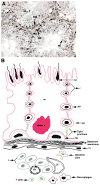Testisimmune privilege - Assumptions versus facts
- PMID: 25309630
- PMCID: PMC4192663
Testisimmune privilege - Assumptions versus facts
Abstract
The testis has long enjoyed a reputation as an immunologically privileged site based on its ability to protect auto-antigenic germ cells and provide an optimal environment for the extended survival of transplanted allo- or xeno-grafts. Exploration of the role of anatomical, physiological, immunological and cellular components in testis immune privilege revealed that the tolerogenic environment of the testis is a result of the immunomodulatory factors expressed or secreted by testicular cells (mainly Sertoli cells, peritubular myoid cells, Leydig cells, and resident macrophages). The blood-testis barrier/Sertoli cell barrier, is also important to seclude advanced germ cells but its requirement in testis immune privilege needs further investigation. Testicular immune privilege is not permanent, as an effective immune response can be mounted against transplanted tissue, and bacterial/viral infections in the testis can be effectively eliminated. Overall, the cellular components control the fate of the immune response and can shift the response from immunodestructive to immunoprotective, resulting in immune privilege.
Keywords: immune privilege; testis; transplantation.
Figures


References
-
- Akimaru K, Stuhlmiller GM, Seigler HF. Allotransplantation of insulinoma into the testis of diabetic rats. Transplantation. 1981;32:227–232. - PubMed
-
- Bajic P, Selman SH, Rees MA. Voronoff to virion: 1920s testis transplantation and AIDS. Xenotransplantation. 2012;19:337–341. - PubMed
-
- Baratelli F, Krysan K, Heuze-Vourc’h N, Zhu L, Escuadro B, Sharma S, Reckamp K, Dohadwala M, Dubinett SM. PGE2 confers survivin-dependent apoptosis resistance in human monocyte-derived dendritic cells. J Leukoc Biol. 2005;78:555–564. - PubMed
-
- Barker CF, Billingham RE. Immunologically privileged sites. Adv Immunol. 1977;25:1–54. - PubMed
-
- Bhushan S, Tchatalbachev S, Klug J, Fijak M, Pineau C, Chakraborty T, Meinhardt A. Uropathogenic Escherichia coli block MyD88-dependent and activate MyD88-independet signalling pathways in rat testicular cells. J Immunol. 2008;180:5537–5547. - PubMed
Grants and funding
LinkOut - more resources
Full Text Sources
